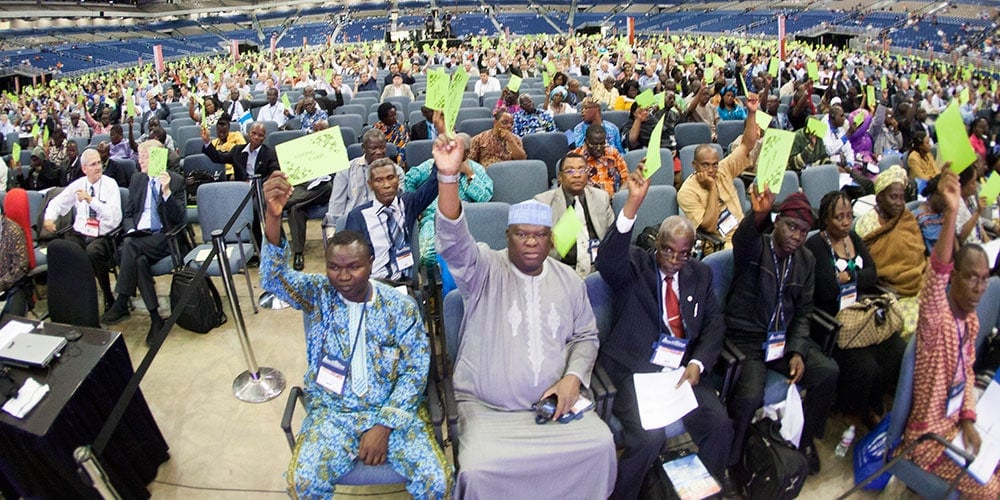
editor-at-large, Adventist Review
The Seventh-day Adventist Church seldom revises its Fundamental Beliefs. So why now?
There are at least six reasons why a denomination might consider a revision to its belief statements. It might wish to
There were no changes in the beliefs adopted Tuesday that represent category G.
While there were no major additions (category F), there were a few minor ones. For example, belief number 2, “The Trinity,” added the phrase “God, who is love.“ Belief number 11, “Growing in Christ,” emphasizes the social dimension of biblical Christianity. Affirming the love of God and emphasizing community welfare has always been important to our church.
Many changes fell in categories A and B. For example, in number 17, Spiritual Gifts, a word changed from “which” to “that”; number 25, The Second Coming, had a phrase changed from “Christ’s coming is imminent” to “Christ’s coming is near.” This change not only has the advantage of using biblical language, but it makes for easier reading and is easier to translate.
There were also many changes under category C, changes in the meaning of language. number 7, which was termed “The Nature of Man,” is now “The Nature of Humanity,” representing gender inclusive language. In number 23, “Marriage and the Family,” the term “partners” was changed to “a man and a woman.” The meaning of the word “partners” with reference to marriage has changed in social usage to indicate a commitment to either same sex or opposite sex marriages. The current meaning was not prevalent in 1980 when the statement was last revised. This editorial change signals that the church will remain true to the Biblical concept of marriage in spite of changes in contemporary culture.
Significant changes took place in category D. In number 9, “The Life, Death, and Resurrection of Christ,” the term “bodily” was added in front of “resurrected.” We have now clarified that the resurrection of Jesus was not a continuing influence nor a spirit experience, but an actual resurrection of Christ in His total person, including His body. Although Scripture emphasizes this point, it is rejected by many theologians, who do not acknowledge the historicity of the biblical account. Thus it was important to add this word “bodily”—unfinished business, carried forward from concerns raised 35 years ago.
Number 18, “The Gift of Prophecy”: Some felt that the church’s prior statement gave Adventist Church cofounder Ellen G. White authority comparable to that of the Bible. Changes have been made to remove this potential ambiguity. White herself emphasizes that her authority is subject to the Scriptures. The new wording of this statement does not in any way diminish the church’s understanding of the authority of the Bible or the prophetic authority of Ellen G. White.
Number 8, “The Great Controversy”: The previous statement contained a phrase on the “worldwide” nature of the biblical flood. The intent of that statement was to represent the biblical teaching that the flood covered the entire world. It was not anticipated that “worldwide” would be re-interpreted by those who do not accept the historicity of Genesis 1-11 to mean “then known world,” portraying a large regional flood. Thus, this GC session changed the word to “global.”
Number 6, “Creation” was the primary reason that the Statement of Fundamental Beliefs was reviewed at this GC session. The existing statement has been re-interpreted by some to mean almost anything they wish about origins, including theistic evolution. Thus the 2004 Annual Council produced a statement that clarified that life on this Earth took place just as stated in Genesis 1 and 2. Those who chose to re-interpret Fundamental Belief number 6 maintained that the 2004 Annual Council statement was not authoritative since it was not voted at a GC session. Thus, the 2004 statement was affirmed at the 2010 GC session with the request that the substance of the action be worked into the Statement of Fundamental Beliefs. The revised statement passed by this session makes it clear that God created life in six actual days, and with the addition of the Sabbath, it was a week as we know it today.